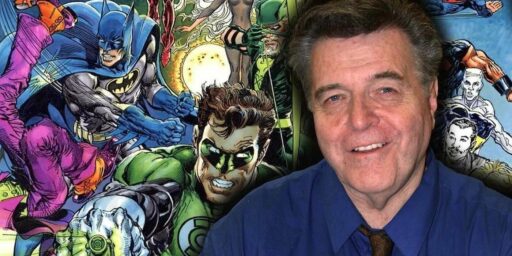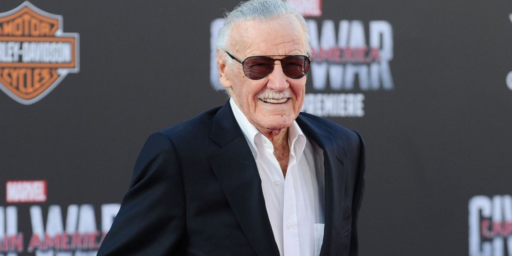Back to Batman Foreign Policy
Two things to follow up on my post on The Dark Knight and foreign/security policy.
First, in thinking more about the movie, I will say that there are two scenes/actions by Batman that could be seen to mirror part of the GWoT debate (and I will be vague so as not to spoil anything). There is an interrogation scene and a scene about surveillance that raises privacy questions. I note, however, that in both cases they deal with a person who is known to be guilty and not only guilty, but still in the process of committing extremely violent crimes. Much like scenes in 24 or the ever-popular ‘ticking timebomb” scenario, the guilt and threat presented by the person against whom extraordinary measures are being used is unambiguous.
Of course, the irony on the interrogation scene is the information that the interrogator wants is ultimately freely shared (no extraordinary interrogation techniques were actually needed) and in regards to the privacy issue there is a rather clear check on the system that makes abuse of the system impossible. And again, in both scenes, the only person being harmed is as guilty as one can be–no real moral conundrum at all.
All of this feeds into my next point, which is that Matthew Yglesias captured well in the following sentence my basic point about the comparison of the movie to reality and where I disagree with Klavan as well as most of the commenters at OTB about the post:
I think Cheney would look at the movie and say “see — this is what we’re doing.” I look at the movie and say “see — if you were fighting a comic book bad guy and you were a comic book hero then your policies would make sense.”
And this is my basic point: the paradigm in fighting terroristic organizations is hardly that of the fight against the supervillain (regardless of how it is often presented as such to the public). As I noted yesterday, the destruction of Saddam (the supervillain in Iraq) did not solve the problem and while getting Osama bin Laden would be great, that won’t solve the problem of Islamic extremism. In the movies catching the Joker ends that problem, in real life getting the iconic leader may solve nothing.
Beyond that, like in the interrogation and surveillance examples above, the issues in the movie/comic is straightforward: focusing such tools only on the known supervillain. Yet in real life those tools end up being used on persons other than the villain because we are not always sure who the villain is. In the real world, people who don’t deserve to be sent to Guantanamo and hardly interrogated are and in the real world the innocent get caught up in the surveillance dragnet.
Put another way, let me quote Porch Dog:
this is precisely why I would discourage people from trying to find the exact, real-world fit for the commentary made in The Dark Knight…it’s fantasy….real over the top, adolescent-inspired fantasy. The main character is a ninja that dresses up like a bat. The main bad guy is the lead singer of the Insane Clown Posse.
As such, it makes for a poor guide to much of anything in the real world.






Of itself, of course not. But, to paralell your point, when was the claim offered by the administration, that taking out Saddam, or ANY one person including OBL, would be the solution to the overarching issue of Islamic extremism?
I suggest that any kind of parallel betwen the fantasy movie world and the reality of the WOT falls apart at that point. Which, I think, is precisely why so many, particularly on the left, find it a diffucult effort to get behind; there’s no single focal point, no indvidual to point at.
Interestingly, it’s the anti-Bush screeds where you’ll most often find reference to OBL still being at large… as if that mattered, beyond the level of feel-goodism. I’ll leave that point to the reader to diagnose, and compartmentalize.
I will agree with you here, and almost made a similar point in the above post: i.e., that the common critique about OBL also engages in the supervillain paradigm.
the information that the interrogator wants is ultimately freely shared (no extraordinary interrogation techniques were actually needed)
N.b. also that the Joker switches the addresses to mislead Batman, so that Batman thinks he’s going to Rachel but really he’s going to Harvey Dent. Thus, as the Joker well knows, minimizing the odds that Rachel will survive.
Ah, but it inspires such fascinating debate on the topic of fighting terrorism.
Anderson: good point.
It is intellectually dishonest to do as Yglesias does and make your own words the words of your political opponent. Who knows what Dick Cheney would say about the movie? If your debate come down to what you say and what you say your opponent says then guess who wins?
This exercise of comparing a movie to real life politics seems very silly. Dr. Taylor sees it as such and hopefully others will soon.
Steve,
It’s a fair point and I prefer not to ascribe thoughts to other. Still, I do think (as the Klavan article that started all this underscores–as do some of the commenters to my original post) that some who might broadly be termed “neconservative” (not one of my favorite terms, btw) do look at the movie and think to themselves “see — this is what we’re doing.†Cheney does have some symbolic value as perhaps the key neocon. As such, I understand why Yglesias wrote what he did.
“focusing such tools only on the known supervillainâ€
You may want to watch the movie again. The cell phone technologies they were using not only monitor the phone conversations of everyone that used them but everyone’s movements as well. They even stated in the movie that such a powerful tool could be misused. The Fox character resigns over the issue.
The issue isn’t if such power could be abuse but should it be use to saves lives like it did. Same issues have been argued about to Bush’s surveillance programs.
What is this “that problem†or “the problemâ€. In the movies/comic books capturing a single villain does not solve all crime and doesn’t prevent other villains from popping up. No one said that capturing Saddam would solve all problems. Capturing him and his sons did take care of some problems.
Surely you are not suggesting that Batman shouldn’t have taken out the Joker?
Yes comic books are fictional but that doesn’t mean they can’t explore the issue of the real world. Some would say comics are able to cut through the clutter to explore the real human conflicts and emotions.
My point was that the tech is used once to apprehend the Joker and then is destroyed. It isn’t kept around just in case it could be useful again. This would be the direct opposite of the programs that the Bush administration has supported.
I am not sure how you think that was my point. My point was the catching the Joker solved all of the Joker-related problems. It is simple and neat, which is exactly what the real world isn’t.
I love comics and am a lifelong Batman fan. And yes, one can use all types of fiction to address the human condition. My problem is that it seems to me that the administration and many of its supporters like to see the world in the stark terms of the comics where all is black and white and if you just pummel the right people all will be well.
“Joker-related problemsâ€
Vague statements like that can cause problems if you don’t use them consistent across your comparisons. If you are saying the Joker himself then yes. If you are saying the Joker’s organization and those that support him then no. Same can be said about Saddam. Although I will agree that fiction at least gives a appearance of “wrapping†things up.
“My point was that the tech is used once to apprehend the Joker and then is destroyed.â€
I’m not sure if that solves the issue. If it was fine to use once for the Joker then how about the Riddler or someone even more dangerous? If the machine can be built once it can be rebuild again. If you destroyed it every time would it be O.K.?
I read a great deal of comic books up to 7th grade. Many obvious bad guys and some characters who weren’t obvious and others who were questionable. Yes fiction is usually neater than life.
Your last paragraph is an overstatement. Both left and right have areas that they think in black and white while grays in other areas.
Capturing Bin Laden soon after we invaded Afghanistan would have had great symbolic value. It would have also affected AQ financially as Bin Laden has been a key conduit in channeling money from Saudi Arabia. It would still have some symbolic value, but much less now. He has gotten us into Afghanistan where he wants us. He may still have some value for recruiting, though studies by the US military have shown most recruiting is direct recruiting by ex-fighters.
I think the more harmful fantasy was 24. All too many people bought into torture being a viable information gathering tool. The war has been greatly prolonged because of such fantasies.
Steve
I doubt it. With a more civilized bunch, possibly. But with a bunch of willing 14th century throwbacks, such is the stock in trade, and I doubt it’s made a dent either way.
Heh. So, Cheney takes the place as the focal point. Funny, how that works.
Well, it was Bush who put OBL’s picture up with a “Wanted Dead or Live” caption under it, right?
Well, you tell ME… what would the left have said had OBL been ignored outright? And so, think; whose benefit was that caption for? It was for those who still think of this as some kind of criminal justice action.
Look, I for one have never suggested that ignoring OBL outright would be a benefit, but I’ve also said that focusing on him to the exclusion of the larger problem, partularly given the martyr complex, is at least counter- productive.
It would matter from an intelligence perspective, and would also thoroughly upend AQ’s logistical planning. Probably it would spark more violence, not less, but it would definitely harm AQ.
Doubtful on both points.
First you assume he would allow himself to be taken alive. I think we can rule that out.
Second is of a like with the first. His health issues have precluded him being involved with much planning… a point which would seem to be confirmed by the ops we’ve seen recently from them, that smack of a lack of such planning as you’d expect from OBL. Either there’s no planning going on , or the ones doing the planning aren’t very good at it. Either way, OBL was not at the table when the plans were ebing laid.
Saddam did, I see no reason why it wouldn’t be possible to capture OBL alive.
Yes, but if he has even a vague idea of what others are planning, his capture would put all that in jeopardy. He would also know where most of AQ’s better hideouts are, presumably having been there himself, and where (if not whom) the local contacts are that support their logistical operations.
We apparently ‘read’ the two men differently, then. Obama, by my read is still operating on the idea that what he’s doing is what’s right in the eyes of Allah, and that if killed in the line of that duty, he will be rewarded. He doesn’t care about hanging onto his earthly life.
He won’t allow himself to be captured.
Saddam meanwhile, in the end, was just a frightened old man, in the end, with a lot of hutzpah, but little more. His life in the end was all he had, and he didn’t want to lose it. Rather like the innocents he killed.
Saddam killed to retain power. Obama killed because he figured he was doing God’s will. Major difference.
But that’s a far cry from offing yourself because you don’t want to be hanged. More likely OBL himself won’t be armed when we catch up to him, but will have body guards who are.
If someone figures it’s more heroic and righteous to diein battle from an attacker’s ordinance, they’ll generally find a way to make it happen. Do not under-estimate the mental need on OBL’s part to be a hero to the cause.
He had plenty of opportunity to be a hero for his cause in Afghanistan, but he ran. You obviously have a higher opinion of the man than I do.
Not at all.
Reasons are simple enough; He’s always been given the opportunity, by either chance or planning, or both, to ‘carry on ths truggle’ thereby being even more heroic. Again….It’s always what he sees as “the struggle” that is the driver.
Odd, isn’t it, that no one on this thread has commented on Taylor’s major point: “The issues in the movie/comic is straightforward: focusing such tools only on the known supervillain. Yet in real life those tools end up being used on persons other than the villain, because we are not always sure who the villain is. In the real world, people who don’t deserve to be sent to Guantanamo and hardly interrogated are, and in the real world the innocent get caught up in the surveillance dragnet.”
Might this possibly have something to do with Bitsy’s repeated statement that frequent torture of POWs is an excellent idea in EVERY war, and should be routinely allowed (presumably on the decision of one man by himself, whether a low-level interrogator or the guy in the Oval Office)? And his just-expressed belief that absolutely everyone in the Moslem world was a mortal enemy of all non-Moslems in the first plce, and that the revelation that we’ve been torturing our prisoners therefore makes no new serious enemies for us anywhere in the worldwide Moslem population?